Black voters needed in mid-term elections, but Black issues are still unwelcome in 2014
By Askia Muhammad -Senior Editor- | Last updated: Nov 3, 2014 - 12:46:16 PMWhat's your opinion on this article?
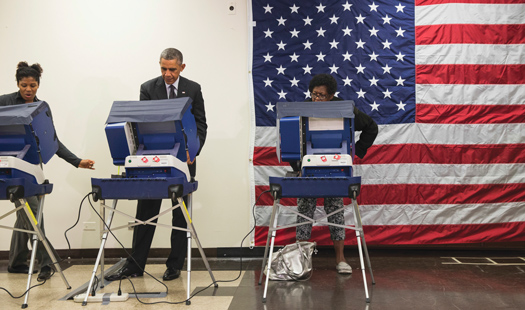
In this Oct. 20 fi le photo, President Barack Obama votes early for the midterm election at the Dr. Martin Luther King Community Service Center in Chicago. President Barack Obama is hitting the Black radio
airwaves to plead for midterm votes, a targeted approach to drumming up Democratic support at a time when many candidates don’t want him around in person. Black turnout will be vital if Democrats are to
hope for victory in states like Arkansas, Georgia, Louisiana and North Carolina that will help determine control of the Senate. And Pres. Obama remains beloved among Black voters even if candidates in those
races are running away from him amid low approval ratings overall. Photo: AP/Wide World photos
|
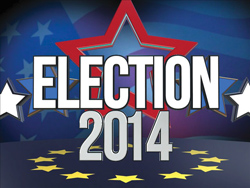
|
Blacks are once again being courted—“Souls to the Polls” in a crucial Senate campaign in Georgia—only this time Democrats don’t want to appear outwardly, too eager to win Black votes, lest they offend Whites, many of whom feel Democrats already pander to Black “special interest groups.”
Ironically, just the opposite is true. While Black voters have been super-loyal to the Democratic Party and to Mr. Obama, giving him more than 90 percent of their votes twice, Black households have suffered more than all others in the tepid recovery from the Great Recession of 2008 in which only the very wealthy have made gains.
According to a report by Edward Luce in The Financial Times, since President Obama took office in 2009, median non-White household income has dropped by almost 10 percent to $33,000 a year, according to the U.S. Federal Reserve’s survey of consumer finances. But the national average saw median incomes fall by only 5 percent.
Still, Black voters remain loyal to Mr. Obama. Their vote has been the decisive margin of victory for Democratic presidents for the last 38 years, including Jimmy Carter in 1976, Bill Clinton in 1992 and 1996, and Mr. Obama in 2008 and 2012, and for statewide elections around the country as well.
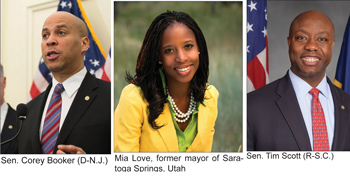
|
Meanwhile, Black voters at times seem conflicted over feeling abandoned by Democratic policy-makers while at the same time fearful of a Republican takeover of the Senate, which would give ultra-conservatives control of both houses of Congress, as well as an ideological grip on the Supreme Court, rendering the last two years of Mr. Obama’s time in office, a struggle to prevent the enactment of the right wing agenda by Congress.
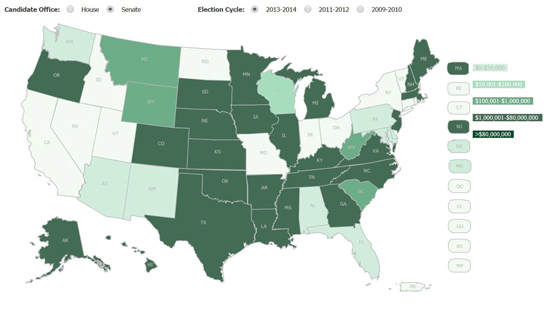
This map represents total independent expenditure spending for or against House or Senate candidates for a two-year period. Senate by state and House by state and congressional district. The data for the color density is taken from "24-hour" and "48-hour" notices of independent expenditures filed in the selected two-year period. Independent expenditures represent spending by individual people, groups, political committees, corporations or unions expressly advocating the election or defeat of clearly identified federal candidates. These expenditures may not be made in concert or cooperation with or at the request or suggestion of a candidate, the candidate's campaign or a political party. Graphics: fec.gov
|
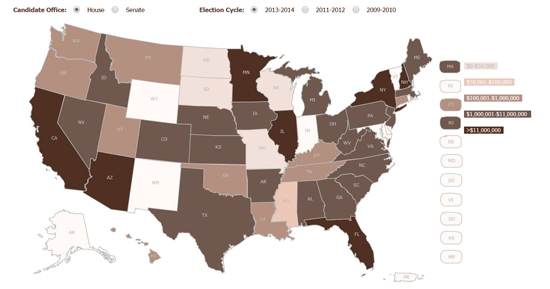
This map represents total independent expenditure spending for or against House or Senate candidates for a two-year period. Senate by state and House by state and congressional district. The data for the color density is taken from "24-hour" and "48-hour" notices of independent expenditures filed in the selected two-year period. Independent expenditures represent spending by individual people, groups, political committees, corporations or unions expressly advocating the election or defeat of clearly identified federal candidates. These expenditures may not be made in concert or cooperation with or at the request or suggestion of a candidate, the candidate's campaign or a political party. Graphics: fec.gov
|
There are even complaints by some activists that the CBC—reputed to be “the conscience of the Congress”—has gone soft on Black concerns like the militarization of local police forces. But that issue which was thrust into the limelight after the meat-fisted response of local Missouri law enforcement agencies in the face of angry protests this summer over the murder of unarmed, 18-year-old Michael Brown is at the heart of why Blacks should vote, according to Dr. David Bositis, a political analyst and statistician who has been following electoral politics for 30 years.
“Somebody who had been in Florida asked me about Black voters,” Dr. Bositis told The Final Call. “ ‘Oh, Black voters are disillusioned with President Obama.’ The first thing I said was: ‘Ferguson. You’ve got a place that’s two thirds Black, but has a White oppressive local government.’ And then I said: ‘If you want a bullet in the back from some rogue, White racist cop, by all means don’t vote.’ It’s not about President Obama.
“Black voters don’t have the luxury of being as irrational as White voters. Black voters have to be rational,” Dr. Bositis warned. But record amounts of contributions from secretive sources may influence enough irrational White voters such that key Senate races will be won by Republicans even if Black turnout is large.
A report, Election Spending 2014: 9 Toss-Up Senate Races, found that outside spending by undisclosed “dark money” groups is on track to “shatter previous records.” According to newly-released data from the Federal Elections Commission, of the nine hotly-contested Senate races this year—Alaska, Arkansas, Colorado, Georgia, Iowa, Kentucky, Louisiana, Michigan, and North Carolina—all but one is expected to beat the previous record for most outside money spent in a senate race, $52.4 million in Virginia in 2012, this according to a report by Common Dreams.org.
“The optimistic assessment suggests that the Republicans would lose in Georgia, lose in South Dakota, lose in Kansas, lose in Louisiana. That’s the optimistic scenario, and of course lose in North Carolina,” Dr. Gerald Horne, who holds the John J. and Rebecca Moores Chair of History and African American Studies at the University of Houston, told The Final Call.
“The pessimistic scenario would mean that Republicans would not only win in all those states I just mentioned but also, Mitch McConnell would prevail in Kentucky, because right now that race is very close. The problem of course is the voter ID movement, and the gutting of the Voting Rights Act of 1965 perpetrated by the U.S. Supreme Court, which is helping to propel that voter ID movement, which is going to really have a negative impact on Black turnout in a state like Wisconsin, where the Republican Governor Scott Walker is in a tight race,” Dr. Horne pointed out.
The “optics” of this election cycle make the situation appear to be grimmer for Democrats and for President Obama than the big electoral picture that is looking ahead to 2016, according to Dr. Bositis. “This happens to be a cycle where the competitive elections are in states where President Obama is not especially popular and where the Democrats are either not very successful, or are marginal,” Dr. Bositis said.
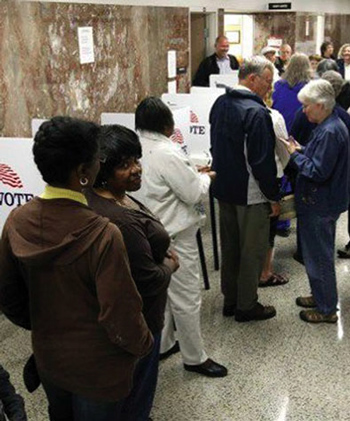
Voters lined up to vote.
|
“Come two years from now, in 2016, the elections are all going to be in states where the Democrats are going to kick Republican (behinds),” he said. “So this is just…we happen to have an election cycle where President Obama and the Democrats are vulnerable,” in 2014.
“Black voters have probably suffered worse than any other voting bloc, particularly since the downturn in the economy in the fall of 2008 which led to the election of Barack Obama, and yet despite the suffering, they remain the most stalwart anti-conservative bloc,” said Dr. Horne.
“I think the explanation is rather simple,” Dr. Horne continued, “I don’t think it’s because Black voters are chumps, or they like being abused, or like being ignored by the Democrats, I think it’s because the Black voting bloc feels that even with the weaknesses and deficiencies of the Democratic Party, that it would be even worse if Republicans obtained more influence,” with their markedly pro-business, anti- civil rights, anti-worker, agenda.
There is a structural anomaly in the U.S. political system. At least 40 percent of the Democratic Party is made up of Black voters—the party’s “core.” The winning electoral formula therefore for Democrats is that with near unanimous, bloc voting by Blacks an additional 30 percent of the White vote is needed to win nationally and in states in play this year like Georgia, Louisiana, and Virginia, with sizeable Black populations.
“The Democratic Party finds itself heavily dependent on Black votes, but they cannot altogether admit that because when they do, it tends to enrage a considerable sector of the White vote,” said Dr. Horne. That means that the president may record ads for Black radio audiences encouraging large turnout on Election Day, but he cannot campaign in person in Atlanta, Denver, or Milwaukee.
“What’s even more remarkable is that many of our friends on The Left are kind of in a fantasy world, where the nitty-gritty realities I’ve just described, somehow elude them,” said Dr. Horne. “The problem is when (the Democrats) try to expand beyond 30 percent, and often times that is needed to win in a state like Florida.”
There are some on The Left, including Black radicals who are unforgiving of the Democratic Party, and even the CBC, for having “sold their souls” to massive corporations, especially those who underwrite most of the gala activities during the recent CBC Annual Legislative Conference. These activists argue that the age-old argument of voting for “the lesser of the evils,’ still leaves voters choosing someone who is evil.
“It’s not just enough to get people in office who look like us,” Netfa Freeman, one of the organizers of a 30-person protest rally on the opening day of the CBC conference in late September told The Final Call. “We have to have people with a revolutionary-minded approach to carry out their job.
“Right now, the Congressional Black Caucus (members) are willing accomplices of the system. The elected officials should emerge from our movements. They should be fortified within the struggle. They should be only people carrying out a platform which comes out of our movement, and not people who are trying to reconcile the differences between the system which is irreconcilable in terms of us trying to realize our interests.”
The only member of Congress who has met that criterion, was former Rep. Cynthia McKinney (D-Ga.) who was defeated twice by moderate opponents because of her outspoken views concerning Israeli abuses of Palestinians, Mr. Freeman said. Others see a brighter view.
“The best case scenario for this election is that the Republicans will not take the Senate, then they will come to realize that they need to expand beyond being the party of Whiteness, and therefore will have to dilute their conservatism in order to appeal to voters who are not defined as White,” Dr. Horne concluded. “That would mean a great step forward for the United States and that way a great step forward for the entire planet.”
“If they immobilize the government, who’s going to get the blame?” Dr. Bositis asked. “Republicans. It’s not going to be President Obama who is always willing to compromise, or the Democrats who are always willing to compromise. It’s going to be the Republicans. And come two years from now, in 2016, the electorate will be 2 percentage points less White, and the Republicans are going to be at a continuing disadvantage.”
“In terms of politics, it’s always a struggle, always a struggle. In terms of economics, in terms of jobs, in terms of income, it’s not just Black voters,” said Dr. Bositis. “There are plenty of White voters who are struggling as well. As a matter of fact, virtually everybody in the country is struggling, as opposed to the top 1/10th of 1 percent.”
INSIDE STORIES AND REVIEWS
-
-
About Harriett ... and the Negro Hollywood Road Show
By Rabiah Muhammad, Guest Columnist » Full Story -
Skepticism greets Jay-Z, NFL talk of inspiring change
By Bryan 18X Crawford and Richard B. Muhammad The Final Call Newspaper @TheFinalCall » Full Story -
The painful problem of Black girls and suicide
By Charlene Muhammad -National Correspondent- » Full Story -
Exploitation of Innocence - Report: Perceptions, policies hurting Black girls
By Charlene Muhammad -National Correspondent- » Full Story -
Big Ballin: Big ideas fuel a father’s Big Baller Brand and brash business sense
By Bryan Crawford -Contributing Writer- » Full Story






 Click Here Stay Connected!
Click Here Stay Connected!








